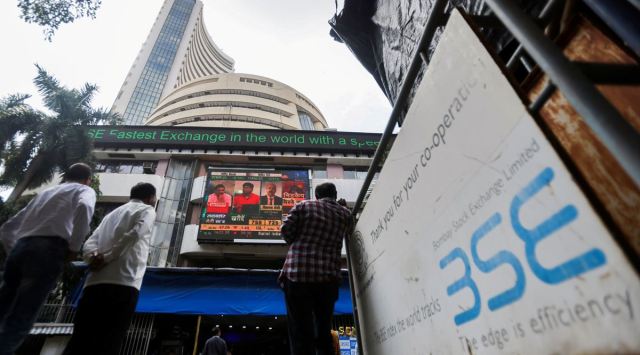- India
- International
Fed meeting this week: Eyes on US amid global dip, Sensex down over 2.6%
In India, the fall was driven by FPIs liquidating their position in anticipation of liquidity absorption moves by the US Federal Reserve in response to high inflation.
 People stand outside the Bombay Stock Exchange (BSE), after Sensex surpassed the 60,000 level for the first time, in Mumbai, India, September 24, 2021. (REUTERS/File Photo)
People stand outside the Bombay Stock Exchange (BSE), after Sensex surpassed the 60,000 level for the first time, in Mumbai, India, September 24, 2021. (REUTERS/File Photo)VOLATILE STOCK markets are undergoing a sharp correction driven by a sell-off in global markets amid indications that the US Federal Reserve will tighten liquidity and hike interest rates.
On Monday, the benchmark Sensex crashed by 2,000 points intra-day, or 2.62 per cent, before closing with a loss of 1,546 points at 57,491.51 — over the last five trading sessions, it has lost 3817 points or 6.2 per cent. The NSE Nifty Index plunged 468 points, or 2.66 per cent, to reach 17,149.10.
The fall was in line with weakness in the European and US markets. While premier indices in UK and Germany fell 2.4 per cent and 3.5 per cent, respectively, the Dow Jones Industrial in US was down 1,080 points or 3.2 per cent Monday (11 pm IST).
Nasdaq, too, was down 4.5 per cent.
In India, the fall was driven by FPIs liquidating their position in anticipation of liquidity absorption moves by the US Federal Reserve in response to high inflation. According to the provisional data with stock exchanges, the FPIs pulled out a net of Rs 3,751 crore from Indian equities on Monday, taking their net outflow over the last nine trading sessions to Rs 15,817 crore.

Experts say markets are likely to remain weak and volatile in the near term as investors are bracing for the Federal Open Market Committee (FOMC) meeting on January 25-26, where it is expected to confirm how soon it will start sucking out the liquidity that has supercharged growth in stocks in recent years.
Rough winds ahead
According to a Morgan Stanley report, the reason for the Fed’s sharp pivot is obvious as inflation has overshot its goals, leading to turbulence for the real economy and a political tightrope walk for the White House. When the Fed first announced its inflation-targeting policy in summer 2020, it was appropriate given the deflationary effects of the pandemic. Therefore, it’s now just as appropriate for the Fed to tighten at an accelerated pace to fight the inflation overshoot, the report said.
Adding to the caution were concerns about a possible Russian attack on Ukraine with the US State Department pulling out family members of its embassy staff from Kyiv. US President Joe Biden was considering sending thousands of US troops to NATO allies in Europe along with warships and aircraft.
The prospect of higher borrowing costs and more attractive bond yields has taken a toll on tech stocks with their lofty valuations, leaving the Nasdaq down 12 per cent so far this year and the S&P 500 nearly 8 per cent. The rout was exacerbated by a slide in Netflix, which tumbled almost 22 per cent on a gloomy forecast for subscriber growth, shedding $44 billion in market value.
“Fear of Fed tapering, increase in interest rates and tightening of fiscal policy by the RBI are some reasons for not letting the market get confidence. The earning season hints at shrinking margins and a decrease in rural demand,” said Sonam Srivastava, Founder at Wright Research, an investment advisory firm.
While Monday witnessed a sharp fall across all sectors, metal and realty indices emerged as the biggest loser. While the realty index fell 5.9 per cent, the metal index fell 5 per cent. The basic materials index and consumer durables index, too, lost over 4 per cent. Banking index was the most resilient as it fell the least, by 1.65 per cent.
Of the 3,706 stocks traded on BSE, 3,106 witnessed decline in their share price on Monday as against 486 advances. The mid cap and small cap indices, too, fell 3.8 per cent and 4.4 per cent, respectively.
In an interesting trend, some of the new-age technology companies, which had recently listed on stock exchanges with much fanfare, fell sharply on Monday.
Zomato fell 19.6 per cent to close at its lowest since listing, and FSN E-Commerce Ventures (Nykaa) saw its shares fall 12.9 per cent to also close at its lowest since listing. Paytm, which has been witnessing a slide in its share price, fell 4.4 per cent to close at 917– its lowest closing since listing last year.
“We see Indian markets following the global course with sell-offs across new age technology companies, and stocks trading at high valuations. We believe that the worst of fears in terms of rate hikes, inflation, and Covid spread is getting priced in. The markets can reach a bottom soon as we see the actual event of interest rate increase happening,” said Divam Sharma, Founder at Green Portfolio.
“We are now seeing signs of reversal of margin financing-based speculation. One of the key reasons for that is the expected increase in interest rates across the world as liquidity becomes tight and inflation picks up,” said Abhay Agarwal, Founder, Piper Serica.
While global investors are extremely sensitive to the Fed commentary that will become available mid-week, analysts say leveraged positions will continue to be unwound, sharply and forcefully in some cases, leading to further corrections.
On the domestic front, the market movement will be influenced by the forthcoming Union Budget in February. The monetary policy review by the Reserve Bank of India in the first week of February will also give an indication about the normalisation of accommodative monetary policy.
While the recovery that has been underway in the Indian economy is encountering headwinds from a rapid surge in infections in a third Covid wave, expectations that the latest Omicron variant may turn out to be more of a “flash flood than a wave” have brightened near-term prospects, the RBI had recently said.
Indian markets will continue to remain on the upper side of valuations and attract foreign capital over the coming years.
Analysts see a huge business opportunity for India over this decade as businesses will witness a surge in exports, import substitution, and benefits from PLI over the coming years. They expect long-term investors to use this opportunity to add those companies to their portfolio that are seeing a correction in valuation but have solid long-term growth prospects.
But they warn that investors should not rush in all at once, but phase out their investment over the next couple of months since valuations in certain parts of the market “are still frothy”. “Our sincere advice to investors is to invest only in companies that have a profitable business model and are leaders of their high-growth industries,” Agarwal said.
Apr 25: Latest News
- 01
- 02
- 03
- 04
- 05







































